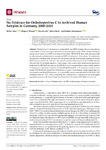2022-03-31Zeitschriftenartikel
No Evidence for Orthohepevirus C in Archived Human Samples in Germany, 2000–2020
Faber, Mirko
Wenzel, Jürgen J.
Erl, Monika
Stark, Klaus
Schemmerer, Mathias
Orthohepevirus C1, also known as rat hepatitis E virus (HEV), has been shown to sporadically cause disease in immunocompromised and immunocompetent adults. While routine serological assays vary in reactivity, rat HEV is not detected in routine HEV RT-PCR. Thus, such infections could be either missed or misclassified as conventional HEV (Orthohepevirus A) infections. We conducted a retrospective screening study among serum and plasma samples from patients suspected of having HEV infection, which were archived at the national consultant laboratory for HAV and HEV between 2000 and 2020. We randomly selected n = 200 samples, which were initially tested reactive (positive or borderline) for HEV-IgM and negative for HEV RNA and re-examined them using a highly sensitive Orthohepevirus C genotype 1-specific in-house RT-qPCR (LoD 95: 6.73 copies per reaction) and a nested RT-PCR broadly reactive for Orthohepevirus A and C. Conventional sanger sequencing was conducted for resulting PCR products. No atypical HEV strains were detected (0 of 200 [0.0%; 95% confidence interval: 0.0%–1.89%], indicating that Orthohepevirus C infections in the investigated population (persons with clinical suspicion of hepatitis E and positive HEV-IgM) are very rare.
Files in this item

